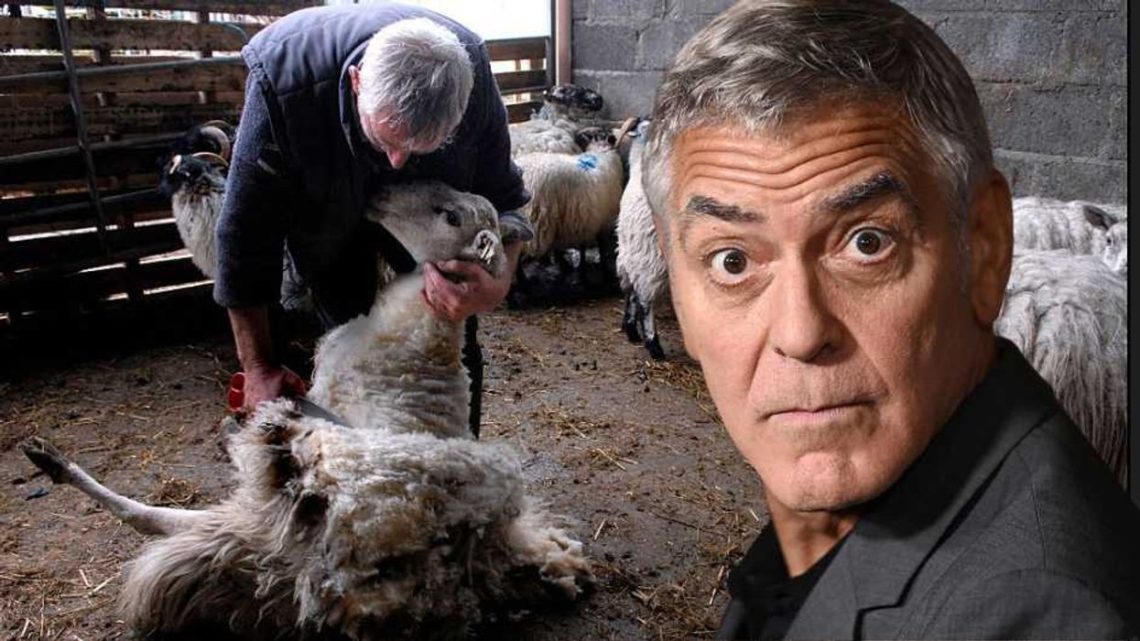George Clooney has it all. The villa on Lake Como, the Hollywood halo, the tequila fortune.
And now — apparently — a farm. He grows olives, you see. Presses them into artisanal oil. Talks lovingly about “the land.”
In Ireland, farmer suicide rates are among the highest in the country. In America, it’s even worse. Farming isn’t just lonely — it’s a daily battle against debt, drought, and despair.
It’s the sort of thing the lifestyle press laps up. The movie star who’s “gone back to nature,” barefoot among the groves, a rake in both senses of the word. But as someone raised on an actual farm in Ireland, I can’t help but laugh. Calling Clooney a farmer is like calling yourself a surgeon because you once removed a splinter with tweezers.
Knee-deep in muck
My father’s a real farmer. He’s the kind of man who measures days in chores, not hours. He’s out there in rain, shine, or two feet of snow, wrangling 100 cattle and 300 sheep with saintly patience. Starting at age 7, I spent 10 years doing the same thing. The man’s hands could sand a doorframe just by clapping. His back has carried more than hay bales. It’s borne the heavy burden of being taken for granted. Farmers feed everyone, yet everyone forgets them. They’re the engine of every economy and the punchline of every town.
The romantic idea of farming — what I call the “Clooney complex” — is built on Instagram filters and feckless fantasy. A celebrity buys a few acres, plants some lavender, adopts a goat named Aristotle, and suddenly it’s “sustainable living.” They wear linen shirts and wax lyrical about the “spiritual rhythm” of rural life, just before jetting back to L.A. in a jet that could single-handedly melt a glacier.
Meanwhile, the real farmer down the road is up at five, knee-deep in muck, coaxing a calf into the world in sideways sleet. The rhythm of real rural life sounds less like “peaceful simplicity” and more like an industrial power washer.
We don’t name our sheep. That’s something people who’ve never farmed don’t understand. When you’ve got 300 of the woolly little delinquents, sentimentality is a luxury you can’t afford. I’ve seen enough lambs die in winter to know why farmers are wary of names. We remember numbers. The birth tags. The weight. The cost of feed. The constant arithmetic of survival. Romanticizing farming is like romanticizing trench warfare — fine for those who’ve never experienced it firsthand.
Debt, drought, and despair
And yet, people love the image. The noble tiller of soil, weathered but wise, standing in a sunset, surrounded by his empire. They never show the invoices, broken fences, silage bills, oppressive environmental regulations, or the bank statements.
They don’t show the nights you lie awake wondering whether the mart price will rise or fall. They don’t show the hours spent alone, the silence broken only by the rattle of a gate or the cough of an animal on the way out. Farming is isolation dressed as independence. You’re your own boss, yes — but your employees are cows, and they never take a day off.
In Ireland, farmer suicide rates are among the highest in the country. In America, it’s even worse. Farming isn’t just lonely — it’s a daily battle against debt, drought, and despair.
Each season, costs climb higher: cement for sheds, grain for feed, diesel for tractors, even medicine for the herd. Profits shrink, pressure builds, and hope thins out like soil after too many harvests. American farmers are now three and a half times more likely to die by suicide than the average worker. The farm devours what it earns. It’s less a business than a benevolent parasite — you feed it in the hope it feeds you back.
RELATED: AI isn’t feeding you
 Photo by Nikada via Getty Images
Photo by Nikada via Getty Images
Learning from the land
But to the celebrity farmer, it’s a lovely way of life. Clooney can pose with his olives, Chris Pratt with his chickens, or “Top Gear” legend Jeremy Clarkson with his camera crew and call it “a return to roots.” Fine, let them have their fun. But real farming isn’t less a return than a sentence. It’s 70-hour weeks, constant pressure, and the faint but familiar panic of wondering what happens if you get sick. No stand-in. No understudy. Just you and the land, locked in an ancient marriage of necessity.
Don’t get me wrong — I love the land. There’s a holiness to it that city life can’t touch. I understand why people are drawn to it, even why they imitate it. But farming isn’t a hobby. It’s not therapy. It’s work in its rawest form — bone-deep, back-breaking, Sisyphus-like labor. And while actors can play at being farmers, farmers can’t play at being actors. When a calf’s stuck halfway out, the only thing rolling is your sleeves. There are no retakes.
If George Clooney wants to plant crops, fine. Let him. But I’ll believe he’s a farmer when he’s up at dawn to dig a drain, when his hands smell permanently of disinfectant. I’ll believe it when his holidays depend on the lambing schedule and not the film schedule. Until then, he’s just a gardener with glorious lighting.
Farming is a philosophy in itself. It teaches humility, patience, and a genuine appreciation for the good times. You learn to solve problems with what’s at hand — wire, hope, and plenty of profanity. It’s not glamorous, but it’s brutally honest.
So when I read about Clooney’s olives, I smile. Until he has scraped muck from his boots with a stick, yelled at a stubborn sheepdog that won’t listen, and worked from first light to last, I’ll save my applause for the real ones: the men and women who work the land not for show, but for the soil itself. Owning a field doesn’t make you a farmer any more than starring in “The Perfect Storm” makes you a fisherman.
The post ‘Farmer’ George Clooney wouldn’t last a minute with my family’s sheep appeared first on TheBlaze.




